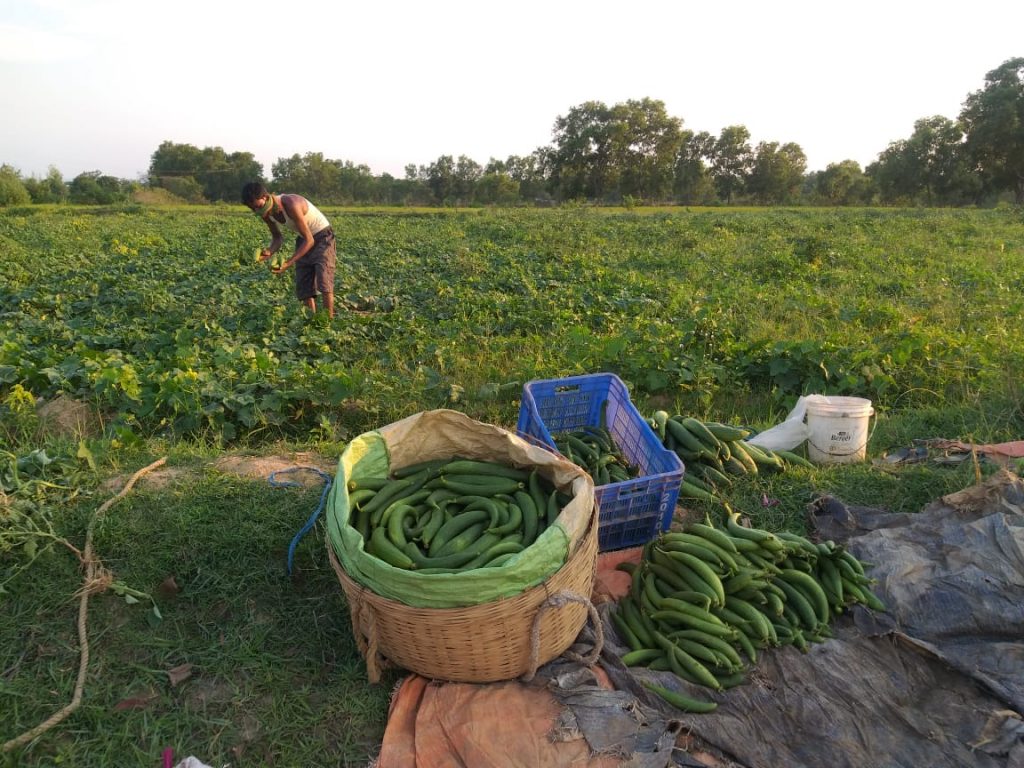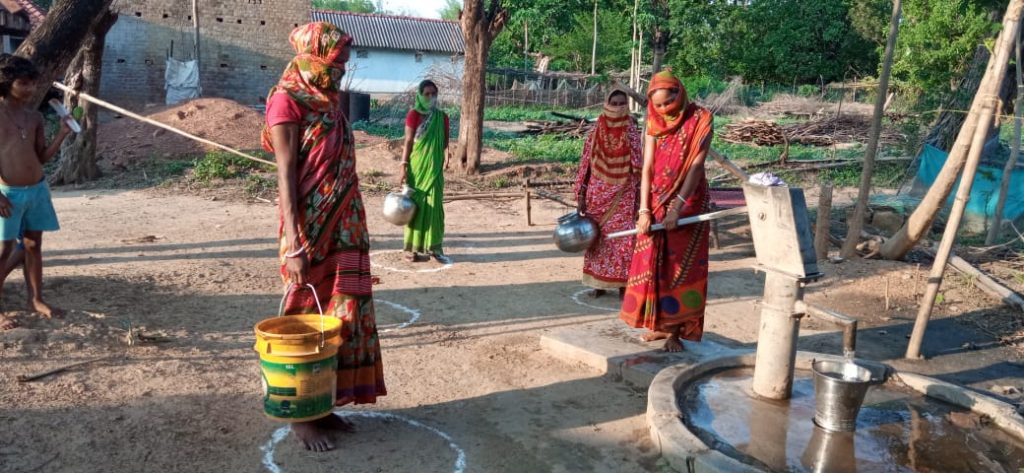Local farmers’ market addresses the adverse effect of COVID-19 on vegetable production
The second wave of COVID-19 is seeing a much larger impact on the rural economy compared to the previous year. The smallholder farmers had to bore the brunt of strict lockdowns and lack of fair return for their produce. In Kalchiti Gram Panchayat of Ghatsila block, Jharkhand, the farmers were unable to sell their fresh produce, added to the poor transportation facilities to reach the nearby markets.
To address this situation, Welthungerhilfe’s partner Center for World Solidarity (CWS) is at the forefront. CWS’s Mr Sanjay Mukherjee and his team taking lead collaborated with the local Panchayat members to find a solution. Despite the regular markets being shut down due to the pandemic, CWS together with the Panchayat, set up local farmer’s market in Kalchiti which enabled the farmers to sell their surplus produce directly with minimized loss.

As a result of this initiatives, four village level local markets have been setting up in Kalchitti. More than 70% of the vegetables produced by the smallholder farmers were consumed in these local markets. The efforts also allowed the farmers to earn their income during these difficult times. More than 33 small and medium vegetable growers are now being benefitted from these local Haat Bazars. The initiatives also helped to minimize wastage of yield and losses during marketing of green vegetables.
Improved hygiene practices through ‘contactless’ Hand Wash Station
Location: Five Panchayats (Hendeljuri, Baguria,Kalchiti, Barakhurshi and Jodisha) of Ghatsila block
Lack of COVID appropriate behaviors among the socially and economically backward communities residing in the above mentioned five Panchayats was a serious cause of concern during the pandemic, especially hand hygiene practices.
Washing hands at the right times and in the right way is the major challenges for poor families of identified malnourished children. The poor amenities and facilities in the area also deters the communities to follow correct hand washing practices regularly. In addition, availability of water is a major problem which restricts people to maintain good hand washing practices when required. Also, maintaining zero contact is the need of the hour while taking water and soap during hand washing process.
CWS’s Program officer Mr. Md Shaban and the team members identified these challenges and undertook the necessary steps to address it. Shaban led the initiative and designed a contactless hand washing station with all facilities like water and soap. This model is also designed for taking care of zero hand touch during the use. This model is operating by just using feet. There is no need to touch it by hands in every use. So, it is safe from contamination by hands.
The local Panchayat members appreciated the contactless hand washing station model and the purpose it is developed for. To address the above challenges Panchayat members helped the organization to identify the families who are very poor and lack proper hand washing facility at home. The PRI members also advised the team to install it in local Aganwadi centres.
Under this initiative, 76 families were supported. They are now regularly washing their hands properly. They are healthy and safe from the infections. Seeing the model, other members of the community appreciated the model and expressed desire to install it in their houses. In the Aganwadi, Sevikas and sahikas are properly maintaining the hand washing practices among children. Also, children now enjoy hand washing through the contactless station. The contactless hand wash station is installed in 26 Aganwadi centers of Ghatsila block and around 800 children have been benefited from this model during COVID-19.
Following COVID Appropriate Behaviours and hygiene practices while collecting drinking water from community hand pumps/taps
Location: Heraganj village of Ghatsila block
With the outbreak of COVID-19 pandemic, fear of being affected by the virus and catching the infection was predominantly all around. In Heraganj village of Ghatsila block, common hand pumps and taps are the only source of drinking water for the entire community. Women who mostly are at the forefront for collecting water for their families had a lot of apprehensions on safe filling of drinking water from community hand pumps during this time.
The local community leaders and PRI members understood the seriousness of the situation and ensured that the transmission of the virus is minimized in the community. Towards this, they suggested the community members especially women to maintain social distancing by painting circular ring at the floor at every 1meter distance and on each turn of water filling process all the community members will sanitize handle of hand pumps or tap(s).
CWS’s team, especially Ms Abha Sinha led the initiative. She provided technical and handholding support on proper maintaining of physical distancing, proper marking, wearing mask while standing in the row and appropriate local technique of sanitizing handle of hand pumps or taps.
The efforts led to the community at large in the entire village to be sensitized by observing the entire initiatives. Adhering to such COVID appropriate behaviors, till date, not a single COVID-19 positive case has been reported in Heraganj village. Now, most of the community members of Heraganj village advice others to follow the above said technique.

With inputs from CWS.



